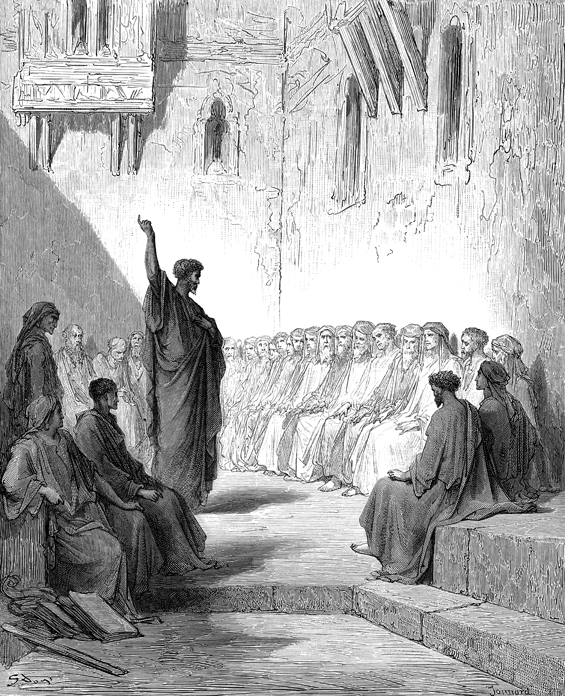
As we introduced this series in the last blog post (CLICK HERE to read the rest of the posts in this series), Archbishop Aquila has summarized five qualities as representative of the “apostolic mindset”: unique calling from the Father, costly imitation of Christ, utter reliance on the Holy Spirit, joyfully countercultural witness, and conviction of the primacy and power of the Gospel. Let us look at each of these at work in the mindset of the apostles from Acts of the Apostles.
In Acts 1:15-26, we read that Peter stands up to coordinate the replacing of Judas, for he was allotted a share in Christ’s ministry, so now somebody must take his place. Judas, of course, having hung himself on Good Friday. But his replacement must be a man who has been there from the get go – that is, the time of John’s baptism to the Ascension. Only two men fit the bill: Barsabbas and Matthias. Ultimately, it is Matthias who replaces Judas amongst the apostles.
The apostles pray for the Lord to reveal which of these two men He has chosen to replace Judas, realizing that it’s not so much their choice, as something of God is here. And to help discern God’s will, they cast lots, which the Jews didn’t consider a game of chance, but a venerated means of discerning God’s will (see Lev 16:7-10; Prov 16:33). Luke Gospel even opens, for example, with Zechariah, father of St. John the Baptist, drawing the lot to burn incense in the Jerusalem Temple. And in this, the lot falls to Matthias, making up the missing piece of the apostolic college of 12, reconstituting the original number representing the restored tribes of Israel.
On a deeper level, what we are seeing here is the doctrine of Apostolic Succession: the apostles are the new leaders, commissioned with Christ’s authority, but that hierarchy of power isn’t to end with their deaths. That Judas needs replacing tells us this. For only if he held a perpetual office of authority would he need replacing. Christ said He would be with the Church to the close of the age, yet the apostles themselves won’t last until then, necessitating others succeed them in authority, the Catholic Bishops today serving as those successors to the Apostles. Furthermore, lots was a means of assigning priestly Temple duties (1 Chron 24:31), Zechariah, as I mentioned, drawing the lot in Luke’s Gospel to burn incense, during which the Angel Gabriel appeared to him. Which shows that the apostles considered themselves to not just hold perpetual offices of authority needing successors, but also priestly duties, even though they’re not Levites. That they draw lots shows they understand themselves to be priests, though this is a different priesthood from the Jewish priesthood of the Old Covenant.
If we return to the main point, what’s so important for our purposes here is the manner in which Matthias is chosen: prayer and the casting of lots. As we read in Acts 1:24-25, speaking of the Apostles, “And they prayed and said, ‘Lord, who knowest the hearts of all men, show which one of these two thou hast chosen to take the place in this ministry and apostleship from which Judas turned aside, to go to his own place.’” As we all should, the apostles pray in the midst of a decision to be made. More importantly, they recognize in that prayer that God has chosen one of the two men. It is a unique calling from the Father to replace Judas, as each of us receive our own unique calling. Therefore, it is not up to the apostles to choose the one they think is best, but to pray for the understanding of the one God has chosen. And to help discern God’s will, they cast lots to help discern God’s will.
While we may not all be called to be apostles, we all, nonetheless, have our own unique calling from the Father, to be discerned in prayer. What role am I to play in evangelizing the culture surrounding us? It may not be public acts, it may be a life of simple holiness within the home. Regardless, we are all uniquely called by the Father to build up the Body of Christ.

